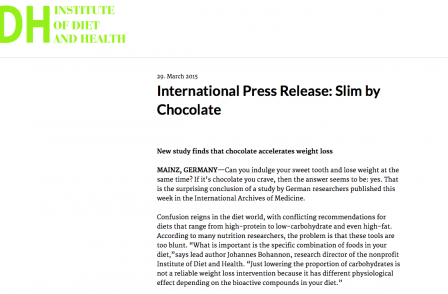
UK news outlets including Mail Online, the Daily Express and the Daily Star were among news organisations around the world foxed into reporting bogus claims that chocolate encourages weight loss.
The story, from last September, was based on a press release put out by the fake Institute of Diet and Health as part of a sting for a German documentary.
A real study scientific study was carried out with just 16 participants split up into three different groups to back up the claim.
Because the sample size was so small, the researchers were able to cherry pick results to find one misleading element which suggested eating chocolate each day aided weight loss.
The study was then published on a journal called the International Archives of Medicine.
The journal is supposed to be peer-reviewed, but charges 600 Euros to publish articles.
Evidently, in this case it made few if any checks to see how robust the study was.
The scientist behind the scam, John Bohannon, explains in detail how he carried it out here.
To be fair to the journalists concerned, this was a sophisticated scam.
But to find out how small the sample size was, they would have simply had to phone up and check (it was not in the full journal write-up).
The story made the front page of Bild, Germany’s top-selling newspaper.
Bohannon said: “When reporters contacted me at all, they asked perfunctory questions. ‘Why do you think chocolate accelerates weight loss? Do you have any advice for our readers?’ Almost no one asked how many subjects we tested, and no one reported that number. Not a single reporter seems to have contacted an outside researcher. None is quoted.”
The lessons from this story appear to be:
- Always check the sample size
- Always sanity check stories wth an expert in the field
- Beware bogus organisations set up on fake websites
- Beware flakey pay-to-play peer-review scientific journals.
Email pged@pressgazette.co.uk to point out mistakes, provide story tips or send in a letter for publication on our "Letters Page" blog
